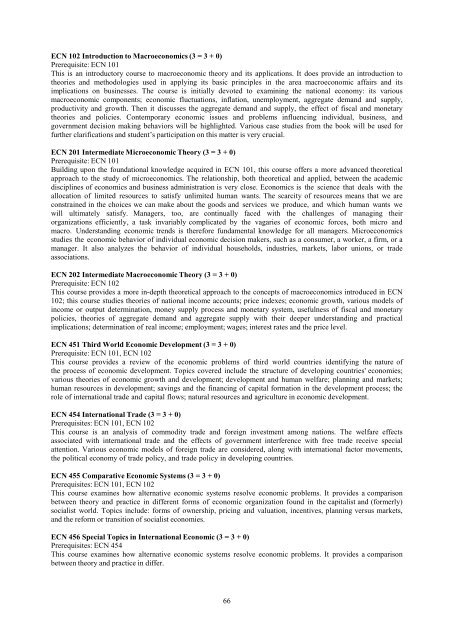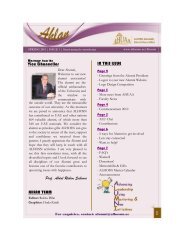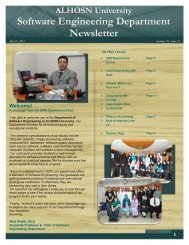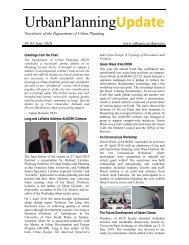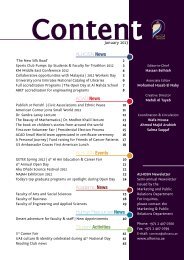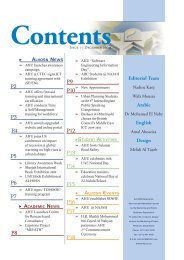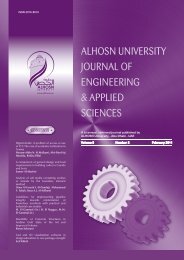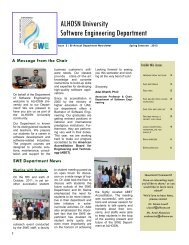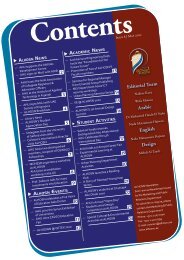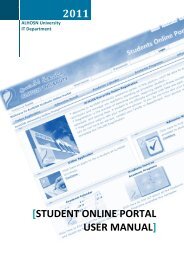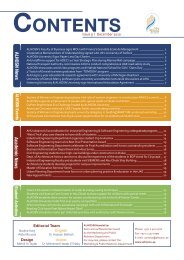ALHOSN University Catalogue Global Knowledge with Local Vision ...
ALHOSN University Catalogue Global Knowledge with Local Vision ...
ALHOSN University Catalogue Global Knowledge with Local Vision ...
You also want an ePaper? Increase the reach of your titles
YUMPU automatically turns print PDFs into web optimized ePapers that Google loves.
ECN 102 Introduction to Macroeconomics (3 = 3 + 0)<br />
Prerequisite: ECN 101<br />
This is an introductory course to macroeconomic theory and its applications. It does provide an introduction to<br />
theories and methodologies used in applying its basic principles in the area macroeconomic affairs and its<br />
implications on businesses. The course is initially devoted to examining the national economy: its various<br />
macroeconomic components; economic fluctuations, inflation, unemployment, aggregate demand and supply,<br />
productivity and growth. Then it discusses the aggregate demand and supply, the effect of fiscal and monetary<br />
theories and policies. Contemporary economic issues and problems influencing individual, business, and<br />
government decision making behaviors will be highlighted. Various case studies from the book will be used for<br />
further clarifications and student’s participation on this matter is very crucial.<br />
ECN 201 Intermediate Microeconomic Theory (3 = 3 + 0)<br />
Prerequisite: ECN 101<br />
Building upon the foundational knowledge acquired in ECN 101, this course offers a more advanced theoretical<br />
approach to the study of microeconomics. The relationship, both theoretical and applied, between the academic<br />
disciplines of economics and business administration is very close. Economics is the science that deals <strong>with</strong> the<br />
allocation of limited resources to satisfy unlimited human wants. The scarcity of resources means that we are<br />
constrained in the choices we can make about the goods and services we produce, and which human wants we<br />
will ultimately satisfy. Managers, too, are continually faced <strong>with</strong> the challenges of managing their<br />
organizations efficiently, a task invariably complicated by the vagaries of economic forces, both micro and<br />
macro. Understanding economic trends is therefore fundamental knowledge for all managers. Microeconomics<br />
studies the economic behavior of individual economic decision makers, such as a consumer, a worker, a firm, or a<br />
manager. It also analyzes the behavior of individual households, industries, markets, labor unions, or trade<br />
associations.<br />
ECN 202 Intermediate Macroeconomic Theory (3 = 3 + 0)<br />
Prerequisite: ECN 102<br />
This course provides a more in-depth theoretical approach to the concepts of macroeconomics introduced in ECN<br />
102; this course studies theories of national income accounts; price indexes; economic growth, various models of<br />
income or output determination, money supply process and monetary system, usefulness of fiscal and monetary<br />
policies, theories of aggregate demand and aggregate supply <strong>with</strong> their deeper understanding and practical<br />
implications; determination of real income; employment; wages; interest rates and the price level.<br />
ECN 451 Third World Economic Development (3 = 3 + 0)<br />
Prerequisite: ECN 101, ECN 102<br />
This course provides a review of the economic problems of third world countries identifying the nature of<br />
the process of economic development. Topics covered include the structure of developing countries' economies;<br />
various theories of economic growth and development; development and human welfare; planning and markets;<br />
human resources in development; savings and the financing of capital formation in the development process; the<br />
role of international trade and capital flows; natural resources and agriculture in economic development.<br />
ECN 454 International Trade (3 = 3 + 0)<br />
Prerequisites: ECN 101, ECN 102<br />
This course is an analysis of commodity trade and foreign investment among nations. The welfare effects<br />
associated <strong>with</strong> international trade and the effects of government interference <strong>with</strong> free trade receive special<br />
attention. Various economic models of foreign trade are considered, along <strong>with</strong> international factor movements,<br />
the political economy of trade policy, and trade policy in developing countries.<br />
ECN 455 Comparative Economic Systems (3 = 3 + 0)<br />
Prerequisites: ECN 101, ECN 102<br />
This course examines how alternative economic systems resolve economic problems. It provides a comparison<br />
between theory and practice in different forms of economic organization found in the capitalist and (formerly)<br />
socialist world. Topics include: forms of ownership, pricing and valuation, incentives, planning versus markets,<br />
and the reform or transition of socialist economies.<br />
ECN 456 Special Topics in International Economic (3 = 3 + 0)<br />
Prerequisites: ECN 454<br />
This course examines how alternative economic systems resolve economic problems. It provides a comparison<br />
between theory and practice in differ.<br />
66


